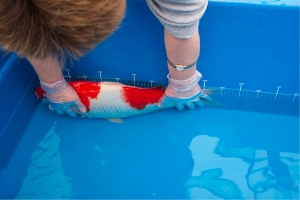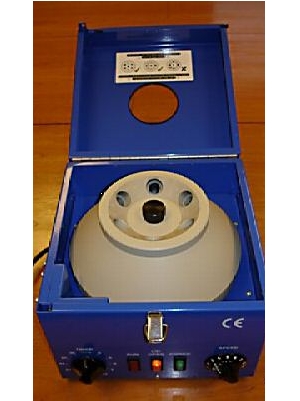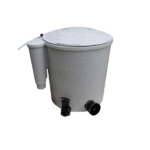The Diseases of Fish (England and Wales) Order 2007 (SI 2007 No.864), which came into force on 6 April 2007, makes it a legal obligation to report suspicion that inland waters have become infected with KHV Disease.
Healthy Koi Ltd is continually improving their viral detection techniques in their determined fight against KHV. We have considerable experience in viral disease over many years and we are constantly adjusting our detection protocol, as technology advances to meet the needs of industry.
 Up to the summer 2006, the main diagnostic tool which we used to confirm our pondside diagnosis has been the Polymer Chain Reaction (PCR) test. This test usually involves the culling of the Koi for viral and pathological examination. However, the test results are only viable during the active stage of the disease and does not detect the latency of carriers which can become active when the required temperature and stressors conditions are met, to re-infect others.
Up to the summer 2006, the main diagnostic tool which we used to confirm our pondside diagnosis has been the Polymer Chain Reaction (PCR) test. This test usually involves the culling of the Koi for viral and pathological examination. However, the test results are only viable during the active stage of the disease and does not detect the latency of carriers which can become active when the required temperature and stressors conditions are met, to re-infect others.
 With the development of the ELISA (Enzyme Linked Immunosorbent Assay) test, a small blood sample is taken from live fish, which are anethised first. Koi which have been exposed to KHV or have been vaccinated will carry antibodies which, within a prescribed time frame, can be detected by the supporting laboratory. If positive, the Koi will have the potential to transmit the virus to naive (previously unexposed) Koi and cause a disease outbreak in those fish. In addition to the ELISA test, there are several more tests currently in the pipeline which will be available later this year.
With the development of the ELISA (Enzyme Linked Immunosorbent Assay) test, a small blood sample is taken from live fish, which are anethised first. Koi which have been exposed to KHV or have been vaccinated will carry antibodies which, within a prescribed time frame, can be detected by the supporting laboratory. If positive, the Koi will have the potential to transmit the virus to naive (previously unexposed) Koi and cause a disease outbreak in those fish. In addition to the ELISA test, there are several more tests currently in the pipeline which will be available later this year.
Should anybody have the slightest concern with regards to the possibility of KHV, please do not hesitate to contact us at any time and talk through any difficulties you may have. In most cases, the problems are likely to lie in other areas and can easily be remedied. We are more than pleased to make a follow up pond visit and if necessary, take samples for viral, bacterial and sensitivity testing.


